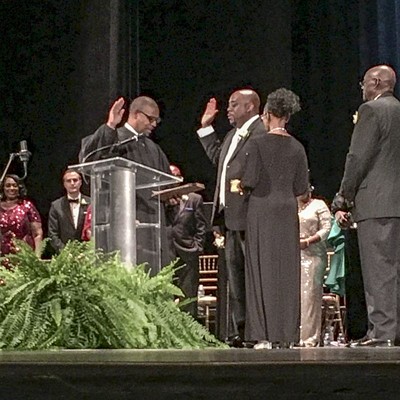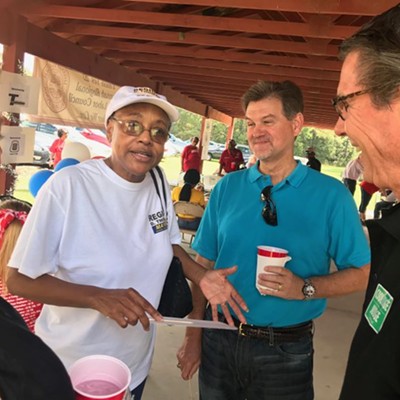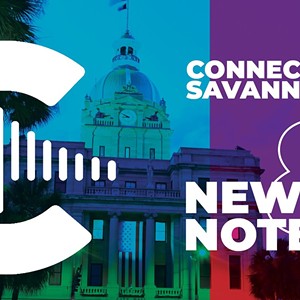OVER THE PAST few days, you've probably heard and read a lot about former Savannah Mayor Floyd Adams Jr., who passed away Saturday at age 68.
You've heard that the city's first African American mayor was "everybody's mayor." That he sought to serve "all Savannahians." That he was a great friend and family man.
All that's true.
But for those who weren't here from 1996-2003 — or who perhaps only remember Adams from several unsuccessful later bids — I wanted to go beyond the platitudes and talk about how pivotal his stint at City Hall was, and how in some ways the current occupants of that building have a ways to go to live up to his precedent.
The first thing to know that you might not have read is how controversial his election as mayor was in some quarters. In a time when the nation's first black president is looking at the back end of two terms in office, it's hard to imagine.
The truth is the prospect of the city's first black mayor was greeted not only by consternation among some white residents, but something approaching outright panic.
It was a panic rooted not in Adams himself — who always placed more importance on getting things done than in selling himself — but in the changing demographics of a city becoming inexorably more African American. Adams won his first term by only 256 votes in a runoff, but that was the writing on the wall signaling the end of overwhelming, predictable white political power.
The next thing to know is that despite his groundbreaking election, Adams was not only the antithesis of a revolutionary, he was in every sense a traditionalist and a made member of the local establishment.
A city alderman from 1982-1996 before elected as mayor, Adams was part of the old guard Democratic machine, which first consolidated power with the election of Mayor John Rousakis in 1970 — not coincidentally also the same year Savannah's first black alderman, Bowles Ford, was elected.
Like Ford, an insurance salesman, Adams also made his living in the private sector, as a newspaper publisher like his father (another reason I liked him). Unlike many local African American leaders, Adams was a product of a private school education, and a Catholic one at that.
Adams attended St. Pius X School with Supreme Court Justice Clarence Thomas. Along with Thomas, Floyd was an altarboy at St. Benedict the Moor Catholic Church on East Broad Street. And like Thomas, Adams was conservative in outlook.
In an interview with Savannah's Creative Loafing, which I once edited, Adams said "Most people want to automatically label blacks as liberal. I'm very fiscally conservative. When I air my views on a conservative level, some people think I'm Republican."
His racial identity, while clearly very important to him, simply wasn't his prime self-identifier. Adams viewed himself as a Christian, a Savannahian, and a businessman first.
One of his first acts as mayor — and one which caused some outrage in the black community — was to attend the annual Confederate Memorial Day wreath-laying. His logic was simple: They're fellow Savannahians, and I'm their mayor too.
It was a powerful gesture which, however tone-deaf it might seem in today's highly charged environment of hypervigilance on social issues, went a long way towards calming the irrational fears of many.
That said, one thing you probably didn't hear in all the soft-focus eulogies over the past few days was the fact that Adams never shied away from taking on the white power structure when he thought necessary.
As mayor and later as a school board member, he could be very assertive, often angrily and acerbically so, in seeking equal opportunity, whether it was attacking the Southside Fire Department for having no black firemen, or seeking to take away the Oglethorpe Club's liquor license because it had no black members.
The difference was that with Adams, Savannah's age-old racial tensions boiled down to individual battles to be fought and won, rather than the entire rationale for a career in politics.
It would be left to Adams's successor, Mayor Otis Johnson, to explicitly divide Savannah along racial lines. Johnson, who faced more than his share of racism as the first black graduate of Armstrong, was a different breed of black politician: An academic, an outsider, more confrontational, more assertive about wealth redistribution, with zero business experience.
Johnson's push to give Savannah its first black city manager — in his words, one who "looks like me" — gave us the debacle of Rochelle Small-Toney, whose disastrous tenure we're still trying to recover from.
The contrast between Adams and Johnson wasn't just one of worldview; it was a crossroads. Savannah chose to go Johnson's route, and our government remains largely in his image rather than Adams's.
At the end, Adams was a political fish out of water. Several failed bids for offices from Congress to mayor to school board president showed he had lost touch with black political thought in the Obama era.
On the last day of qualifying in 2007, Adams entered the race to deny Johnson a second term. He got 13 percent of the vote.
In 2011 he faced current Mayor Edna Jackson in her first bid. He got 11 percent.
Adams is gone, and so's his era. At its best, our current power structure represents a more equitable Savannah no longer mired in the past. At its worst it occasionally seems to be a new version of the ancient and corrupt old-boy network, only in this case with nearly all black faces instead of all white ones.
At the crossroads, there's no wrong answer. In a democracy you always have a choice. It would've been interesting, though, to see what might have happened had Savannah stayed on the trail Floyd blazed.





























